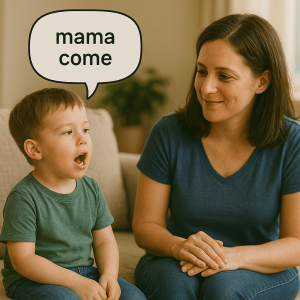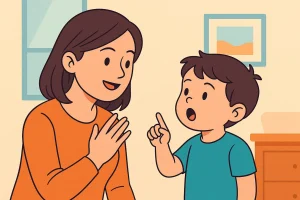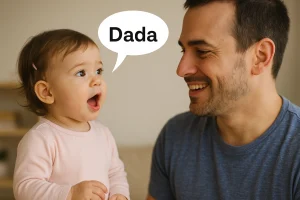9 Myths of Childhood Apraxia of Speech
By Rajini D
Last Updated: February 22, 2024
Have you ever watched a child struggle to say what’s clearly on their mind but just can’t get the words out? This could be more than just a simple case of finding their voice. It might be Childhood Apraxia of Speech (CAS) – a complex speech disorder that often leaves parents and caregivers puzzled and concerned. CAS is not merely about the delay in speech development; it’s a neurological condition where the brain struggles to coordinate the muscle movements necessary for speech. The result? A disconnect between what the child wants to say and what they can physically articulate.
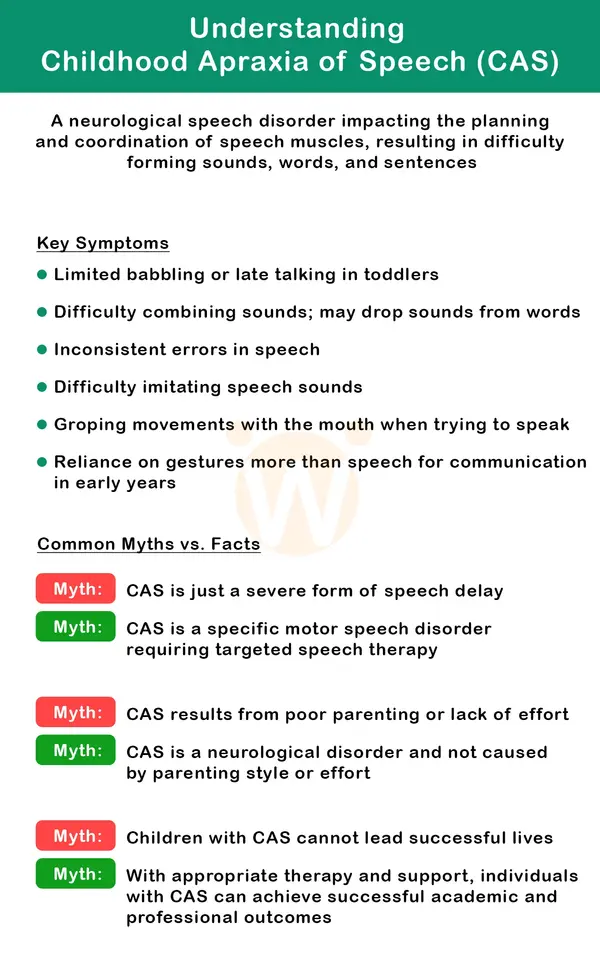
Despite its significance, there’s a swirl of myths and misconceptions surrounding CAS, leading to confusion and often misplaced worry. That’s exactly why we’re here today. Our goal is to clear the fog around Childhood Apraxia of Speech, debunking the most common myths and shedding light on the truths. This journey through facts versus fiction is not just about correcting misinformation; it’s about empowering you, the reader, with knowledge. Knowledge that can transform the way you understand, approach, and support children facing the challenges of CAS.
Myth 1: There’s Only One Type of Apraxia
When we talk about apraxia, especially in children, it’s easy to assume it’s a one-size-fits-all condition. However, this couldn’t be further from the truth. Did you know there are different types of apraxia? Yes, apraxia comes in various forms, with Childhood Apraxia of Speech (CAS) and Acquired Apraxia of Speech (AoS) being two primary types.
Childhood Apraxia of Speech (CAS) is present from birth. It’s a motor speech disorder where children struggle with the precision and consistency of movements necessary for speech. The brain knows what it wants to say, but the message doesn’t get correctly relayed to the speech muscles.
On the other hand, Acquired Apraxia of Speech (AoS) can develop at any age, usually after a brain injury, stroke, or other neurological impacts. Unlike CAS, AoS involves losing previously acquired speech abilities, indicating a disruption in the brain’s ability to coordinate muscle movements for speech.
Understanding the distinction between these types helps in recognizing the specific challenges and interventions each condition demands.
For more insights into how speech therapists can help diagnose and treat different types of apraxia, including CAS, visit our comprehensive guide on the role of speech therapists in online settings.
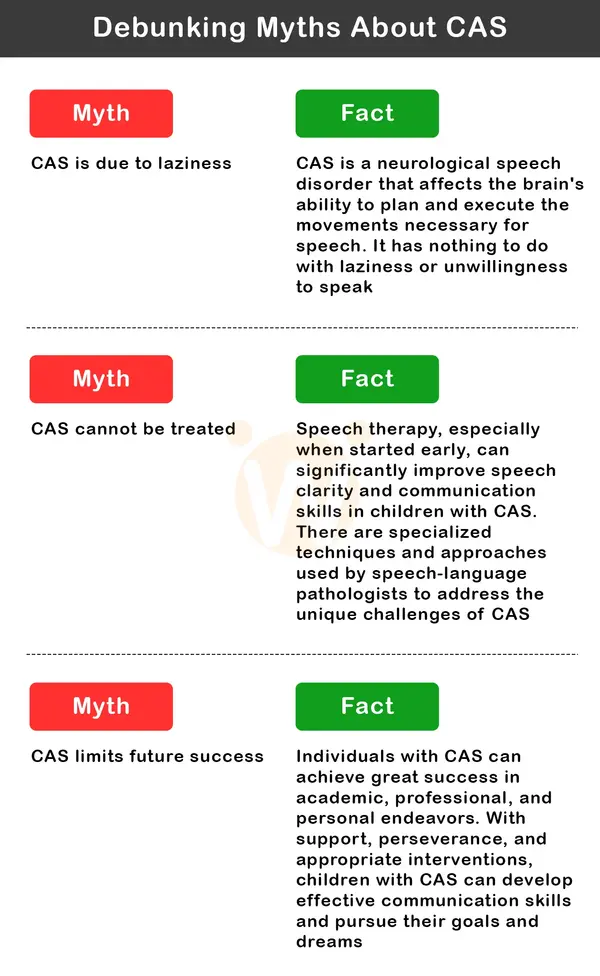
Myth 2: CAS Is Due to Muscle Weakness
A common misunderstanding is that CAS stems from muscle weakness, leading some to believe that strengthening exercises for the mouth and jaw will aid in overcoming the disorder. However, the root of CAS is neurological, not muscular. It’s about the brain’s difficulty in sending the right signals at the right time to produce speech.
The importance of specialized speech therapy cannot be overstated here. Unlike general muscle-strengthening exercises, speech therapy for CAS focuses on improving the coordination between the brain and speech muscles. It involves strategies tailored to each child’s specific needs, helping them find their voice through precise, repeated practice.
Learn more about how these exercises can support speech therapy efforts.
Takeaway for Readers:
If you suspect your child has CAS, seeking specialized speech therapy is crucial. Remember, it’s not about strengthening muscles but enhancing the brain-muscle connection necessary for clear and consistent speech.
As we navigate through these myths, it’s essential to approach Childhood Apraxia of Speech with a clear understanding and the right support. At Wellness Hub, we’re committed to providing families with the resources and guidance they need to support their children’s speech development journey.
Myth 3: Speech Delay Equals CAS
One common misunderstanding is conflating speech delay with CAS. While both conditions involve challenges with speech, they stem from different causes and require unique approaches to intervention.
Speech delay is generally characterized by a slower development of language skills compared to peers. Children with speech delay might eventually catch up without extensive intervention, especially with early support and stimulation.
Differentiating between speech delay and CAS is crucial for proper intervention. Discover how to understand your child’s communication development more deeply.
Childhood Apraxia of Speech (CAS), however, involves more than delayed speech. It’s a motor speech disorder where the brain struggles to plan and coordinate the muscle movements necessary for speech. This condition doesn’t resolve on its own and requires targeted speech therapy for improvement.
Checklist of Signs to Watch for in CAS
- Difficulty moving smoothly from one sound, syllable, or word to another
- Limited vocabulary for their age group
- Saying words differently each time or having difficulty combining sounds
- Pauses between sounds
- Simplifying words by replacing difficult sounds with easier ones
If you’ve noticed these signs in your child, it might be time to consult a speech-language pathologist who can provide a comprehensive evaluation.
Signs of CAS vs. Typical Speech Development Delays
| Age | Signs of CAS | Typical Speech Development |
|---|---|---|
| 18 months | Limited babbling- Difficulty combining sounds- Uses gestures over words | Says 10-20 words – Can follow simple commands |
| 2 years | Struggles to imitate sounds- Limited vocabulary- Inconsistent errors with sounds or words | Says 50 or more words – Starts combining two words, like “more milk” |
| 3 years | Difficulty with longer sentences- Groping movements with mouth when trying to speak- Relies on familiar phrases or repeats same words. | Uses sentences with 3 or more words- Speech is understandable to strangers at least 75% of the time. |
Myth 4: Children Outgrow CAS Naturally
Another myth is the belief that children will naturally outgrow CAS without any intervention. This hopeful yet mistaken belief can lead to delays in seeking the professional help that is crucial for overcoming the challenges of CAS.
The truth is that CAS requires specialized speech therapy focused on improving speech coordination and timing. Early intervention is key to helping children with CAS develop effective communication skills.
Early intervention is key in managing CAS. Learn how parents play a crucial role in supporting their children through online speech therapy.
Myth 5: CAS Indicates Intellectual Disability
A particularly harmful myth is the assumption that CAS is indicative of an intellectual disability. This misconception can lead to undue stigma and misunderstanding about the capabilities of children with CAS.
Clarification:
CAS is a motor speech disorder that affects the ability to form sounds and words, not a reflection of cognitive ability. Children with CAS can have a wide range of intelligence levels, just like children without CAS. The challenge lies in the coordination of speech muscles due to neurological reasons, not in understanding language or concepts.
For more information on how various communication difficulties manifest, explore our detailed article. CAS does not reflect a child’s cognitive abilities
Engagement: Inspirational Stories
To underscore this point, consider the achievements of individuals who’ve grown up with CAS and gone on to succeed in various fields. For example, there’s the story of a young woman who, despite her struggles with CAS, became a renowned public speaker and advocate for children with speech disorders. Her journey from barely being able to communicate to addressing large audiences is a testament to the fact that CAS has no bearing on one’s intellectual capabilities or potential for success.
Myth 6: CAS and Dyspraxia Are the Same
Another common confusion arises between CAS and dyspraxia, often leading to the terms being used interchangeably. However, there are distinct differences between the two.
- Dyspraxia is a broader condition that affects physical coordination and can impact a person’s ability to perform a wide range of activities, from writing to jumping. While it can include challenges with speech, it’s not limited to speech production.
- Childhood Apraxia of Speech, in contrast, specifically refers to a speech disorder that makes it hard to speak. CAS does not necessarily affect other areas of physical coordination.
Our in-depth look into dyspraxia clarifies the distinctions. Confused about the differences between CAS and dyspraxia?
Quick Fact: CAS vs. Dyspraxia
- CAS: Focuses specifically on speech production difficulties due to problems with motor planning and execution.
- Dyspraxia: A broader motor skills disorder that can affect the planning and coordination of movements across the body, including speech.
This distinction is crucial for ensuring that children receive the right support and interventions tailored to their specific needs.
Myth 7: Only a GP or Pediatrician Can Diagnose CAS
A common misconception is that the diagnosis of CAS is strictly the domain of general practitioners (GPs) or pediatricians. While these healthcare professionals play a vital role in the initial identification of potential developmental delays or disorders, the specific diagnosis of CAS requires the expertise of a specialist.
Speech-Language Pathologists (SLPs) are professionals uniquely trained to assess, diagnose, and treat speech and language disorders, including CAS. They use a combination of observations, speech assessments, and detailed history to determine if a child has CAS. Their specialized training allows them to distinguish CAS from other types of speech disorders.
Learn more about their role in speech and language therapy.
Reader Action
If you’re concerned about your child’s speech development, the best course of action is to consult with a speech-language pathologist. They can provide a comprehensive evaluation and, if necessary, a tailored treatment plan to support your child’s communication skills. Don’t hesitate to seek out a specialist who can offer the most accurate diagnosis and effective treatment options.
Myth 8: CAS Is Untreatable
Another myth that can leave families feeling hopeless is the belief that CAS is untreatable. This couldn’t be further from the truth. Although CAS can be challenging to manage, there are effective strategies and therapies that can significantly improve speech capabilities.

Speech therapy is the cornerstone of treatment for CAS, focusing on repetitive practice, speech drills, and exercises to improve speech sound production and sequencing. This specialized approach helps children develop the motor planning and execution skills needed for speech. With consistent and targeted therapy, many children with CAS can make remarkable progress.
Discover the best online speech therapy services we offer in Hyderabad for managing CAS effectively.
Myth 9: CAS Limits Future Success
The belief that CAS can prevent children from achieving academic or professional success is not only false but also damaging. CAS is a challenge, certainly, in the realm of speech and communication, but it is by no means a determinant of a child’s future potential.
Check out our article on The Speech Chain: Understanding How We Communicate.
Inspiration: Success Stories
Consider the stories of individuals who, despite their struggles with CAS, have gone on to excel in their chosen fields. There’s the story of a young author who, unable to speak clearly until well into her school years, turned her profound understanding of language and its nuances into a successful writing career. Another example is a tech entrepreneur who, once limited by his ability to communicate verbally, developed innovative software solutions to assist others with speech disorders, turning his challenge into a thriving business.
These stories underscore a powerful message: with the right support, determination, and resources, children with CAS can overcome their communication hurdles and achieve remarkable success.
Engaging with Your Child’s Needs
Supporting a child with CAS goes beyond speech therapy sessions. It involves creating an environment that nurtures confidence, resilience, and independence.
Practical Advice for Parents and Caregivers
- Patience and Understanding: Recognize that communication may be frustrating for your child. Celebrate small victories and show understanding of the challenges.
- Encourage Non-Verbal Communication: Use gestures, sign language, or pictures to support communication, reducing stress and frustration for your child.
- Read Together: Reading aloud with your child can enhance language skills and provide a great opportunity for bonding.
- Technology and Tools: Explore apps and tools designed to support speech development. These can make learning fun and interactive for your child.
- Create a Supportive Community: Connect with other families navigating CAS. Sharing experiences and tips can be incredibly empowering.
Effective Strategies for Supporting Children with CAS
| Strategy | Description | How Parents Can Help |
|---|---|---|
| Use of Gestures | Incorporating hand gestures to communicate can reduce frustration and aid in language development. | Encourage and model the use of simple gestures for everyday needs and objects to enhance communication. |
| Reading Together | Reading with your child can improve language comprehension and expose them to a variety of sounds and words. | Set aside regular reading times to explore new books, pointing out and repeating words to improve speech. |
| Speech Therapy Exercises at Home | Consistent practice of exercises prescribed by a speech-language pathologist can accelerate progress. | Work closely with your child’s SLP to understand the exercises and incorporate them into daily routines. |
Conclusion
Our journey through the nine common myths has illuminated the reality of CAS, highlighting that with correct understanding, parents, caregivers, and educators can extend the most effective support and interventions needed. The challenges faced by children with CAS are significant, yet with targeted early intervention, access to the right resources, and a nurturing environment, their ability to overcome and progress is remarkable.
Wellness Hub is dedicated to empowering families with accurate information, connecting them with specialized therapists, and fostering a supportive community. Our goal is to facilitate a deeper understanding of CAS, ensuring families are not navigating their journey alone but with a wealth of resources and shared experiences at their disposal.
Frequently Asked Questions:
1. What is Childhood Apraxia of Speech (CAS)?
Childhood apraxia of speech is a motor speech disorder in which children struggle with making accurate movements when speaking. Despite knowing what they want to say, they have difficulty coordinating the muscle movements necessary to say those words.
2. How is Childhood Apraxia of Speech diagnosed?
CAS is diagnosed by a speech-language pathologist (SLP) through a combination of assessments, including observing the child’s speech, understanding the child’s speech development history, and conducting specific speech tasks.
3. Can children with Childhood Apraxia of Speech still achieve academic and professional success?
Absolutely. Children with CAS can achieve remarkable success academically and professionally with the right support and intervention. Success stories of individuals thriving despite their diagnosis of CAS highlight the potential for achievement.
4. What are the common myths about Childhood Apraxia of Speech?
Common myths include the belief that CAS is a result of muscle weakness, that it cannot be treated, and that it limits future success. These myths are debunked by understanding that CAS is a neurological disorder requiring specialized speech therapy, not merely muscle strengthening.
5. How can parents support their child with Childhood Apraxia of Speech?
Parents can support their child by seeking early intervention from speech-language pathologists, using supportive communication methods at home, encouraging the use of gestures or sign language, and fostering a positive, supportive environment for their child’s communication efforts.
6. Where can I find resources or support for CAS?
Wellness Hub offers an interactive guide to finding speech-language pathologists, therapists, and support groups for CAS. This resource is designed to connect families with the support and guidance they need.
7. Is speech therapy effective for children with CAS?
Yes, specialized speech therapy is effective for children with CAS. It focuses on improving the planning, sequencing, and coordination of muscle movements for speech, leading to significant improvements in communication skills.
8. Can Childhood Apraxia of Speech be cured?
While there is no “cure” for CAS, consistent and specialized speech therapy can greatly improve speech abilities. Many children with CAS can learn to communicate effectively with the right treatment plan.
9. What differentiates Childhood Apraxia of Speech (CAS) from other speech disorders?
Childhood Apraxia of Speech (CAS) is specifically characterized by difficulty with the motor planning and execution needed for speech, which is not primarily due to muscle weakness or cognitive deficiencies.
10. How early can CAS be diagnosed, and why is early intervention important?
CAS can often be identified in children as young as 2 years old by a qualified speech-language pathologist (SLP). Early intervention is crucial because it takes advantage of the brain’s plasticity in young children, allowing for more effective treatment.
About the Author:
Rajini Darugupally
M.Sc., Speech-Language Pathologist (9+ years of experience)
Rajini is a passionate and dedicated Speech-Language Pathologist with over 9+ years of experience, specializing in both developmental speech and language disorders in children and rehabilitation in adults. Driven by a desire to empower each individual to find their voice, Rajini brings a wealth of experience and a warm, genuine approach to therapy.
Currently, at Wellness Hub, she thrives in a team environment that values innovation, compassion, and achieving results for their clients.
Connect with Rajini to learn more about how she can help you or your loved one find their voice.
Book your Free Consultation Today
Parent/Caregiver Info:
Client’s Details:
* Error Message
